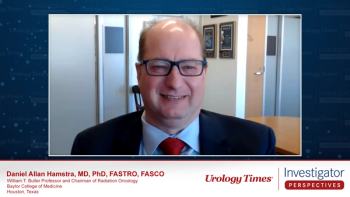
Daniel Allan Hamstra, MD, PhD, FASTRO, FASCO, discusses the importance of rectal spacers in reducing side effects and improving quality-of-life during radiation therapy for prostate cancer.

Daniel Allan Hamstra, MD, PhD, FASTRO, FASCO, discusses the importance of rectal spacers in reducing side effects and improving quality-of-life during radiation therapy for prostate cancer.

Dr Daniel Allan Hamstra discusses common adverse reactions in patients with prostate cancer undergoing radiation therapy, including urinary issues and sexual side effects, and explains the potential impact of rectal spacer devices like SpaceOAR in addressing these concerns.

Dr Hamstra describes the three FDA-approved rectal spacers SpaceOAR, Barrigel, and BioProtect, noting differences in placement technique, advantages, potential risks, and the need for long-term clinical data on patient outcomes.

The SpaceOAR rectal spacer phase 3 trial showed reduced toxicity and improved quality of life, leading to FDA approval, but device-related side effects have emerged with broader clinical use.

The Phase 3 trials for the Barrigel and BioProtect rectal spacers demonstrated a dosimetric advantage and reduced rectal toxicity similar to SpaceOAR, but data on long-term toxicity and patient-reported outcomes is still needed to fully evaluate the newer spacers.

Analysis of SpaceOAR trial and pooled data found reduced penile bulb radiation dose correlated with better preservation of sexual function over long-term follow-up, suggesting rectal spacers help maintain erectile function in some men with prostate cancer undergoing radiation therapy.

Dr Hamstra recommends rectal spacers in certain prostate cancer patients to reduce rectal toxicity, allow dose escalation, and preserve sexual function, but advises judicious use due to potential complications and lack of long-term quality of life data with newer spacers.

Dr Daniel Allan Hamstra highlights ongoing and planned trials investigating rectal spacers in patients with prostate cancer undergoing radiation therapy that he hopes will provide more data on toxicity reduction and preservation of sexual function.